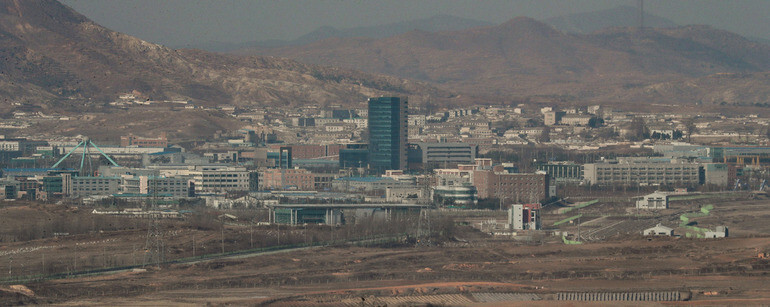hankyoreh
Links to other country sites 다른 나라 사이트 링크
[Editorial] Inter-Korean cooperation needs to updated to match the times

The South Korean government is attempting to amend the Inter-Korean Exchange and Cooperation Act to simplify administrative procedures and allow for wider contact with people in North Korea. The major changes planned include transitioning from an approval system to a reporting system for contact with North Koreans for purposes of inter-Korean exchange and cooperation, waiving reporting for contact among divided family members and unintentional encounters, stipulating local governments as agents for inter-Korean cooperation projects, and instituting Cabinet reviews for suspensions of inter-Korean exchange.
This represents a change in direction from one of government controls on inter-Korean contact to one of increased openness. It is said to have been a response to the increased diversity and complexity of the content and actors involved in inter-Korean exchange and cooperation, as well as calls from civil society for an amendment. This amendment of the law is both realistic and appropriate.
Since the three inter-Korean summits held in 2018, civic groups and scholars have been demanding that the Inter-Korean Exchange and Cooperation Act be amended to lay the groundwork for exchange and cooperation efforts. Many have said the current framework amounts to a permit system, with the Ministry of Unification arbitrarily disallowing contact with North Korea based on report acceptance terms even when said contact ostensibly operated on a reporting basis. There have also been vocal calls for a more decentralized form of North Korea policy, with local governments included as actors in inter-Korean exchange and cooperation efforts in order to reduce the burden on the central government.
It was under the Roh Tae-woo administration that the Inter-Korean Exchange and Cooperation Act was enacted on Aug. 1, 1990, to establish a mechanism for legal guarantees on inter-Korean exchange and cooperation. At the time, the Roh administration explained that it was treating inter-Korean relations as a target for legal regulation after having previously approached it in terms of control. But in February 2016, the Park Geun-hye administration proceeded with a full-scale shutdown of the Kaesong Industrial Complex -- disregarding the aims of the legislation with its “act of the state.”
Some conservatives have argued that the planned changes to the law would “loosen the cordon on North Korea” and “conflict with the National Security Act.” This sort of attitude is regressive even compared with that of the Roh administration 30 years ago. Roh enacted the Inter-Korean Exchange Cooperation Act in 1990 as a follow-up measure to his so-called “July 7 Declaration” of 1988, in which he recognized North Korea -- previously treated a party to hostile confrontation -- as a “partner in exchange and cooperation.” They need to understand that the creation of this law made it possible to meet North Koreans and invest in North Korea without facing punishment under the National Security Act.
The current system for inter-Korean exchange and cooperation was created in the Cold War context as a way of extending exceptional permissions for exchange with North Korea. It makes sense to amend it and reflect the changes in the times 30 years later. Hopefully, a more solid legal foundation will be established for inter-Korean exchange and cooperation to support peace on the Korean Peninsula.
Please direct comments or questions to [english@hani.co.kr]

Editorial・opinion
![[Editorial] Penalties for airing allegations against Korea’s first lady endanger free press [Editorial] Penalties for airing allegations against Korea’s first lady endanger free press](https://flexible.img.hani.co.kr/flexible/normal/500/300/imgdb/original/2024/0502/1817146398095106.jpg) [Editorial] Penalties for airing allegations against Korea’s first lady endanger free press
[Editorial] Penalties for airing allegations against Korea’s first lady endanger free press![[Editorial] Yoon must halt procurement of SM-3 interceptor missiles [Editorial] Yoon must halt procurement of SM-3 interceptor missiles](https://flexible.img.hani.co.kr/flexible/normal/500/300/imgdb/child/2024/0501/17145495551605_1717145495195344.jpg) [Editorial] Yoon must halt procurement of SM-3 interceptor missiles
[Editorial] Yoon must halt procurement of SM-3 interceptor missiles- [Guest essay] Maybe Korea’s rapid population decline is an opportunity, not a crisis
- [Column] Can Yoon steer diplomacy with Russia, China back on track?
- [Column] Season 2 of special prosecutor probe may be coming to Korea soon
- [Column] Park Geun-hye déjà vu in Yoon Suk-yeol
- [Editorial] New weight of N. Korea’s nuclear threats makes dialogue all the more urgent
- [Guest essay] The real reason Korea’s new right wants to dub Rhee a founding father
- [Column] ‘Choson’: Is it time we start referring to N. Korea in its own terms?
- [Editorial] Japan’s rewriting of history with Korea has gone too far
Most viewed articles
- 1Months and months of overdue wages are pushing migrant workers in Korea into debt
- 2Trump asks why US would defend Korea, hints at hiking Seoul’s defense cost burden
- 31 in 3 S. Korean security experts support nuclear armament, CSIS finds
- 4[Editorial] Yoon must halt procurement of SM-3 interceptor missiles
- 5[Guest essay] Maybe Korea’s rapid population decline is an opportunity, not a crisis
- 6Fruitless Yoon-Lee summit inflames partisan tensions in Korea
- 7[Column] Can Yoon steer diplomacy with Russia, China back on track?
- 8At heart of West’s handwringing over Chinese ‘overcapacity,’ a battle to lead key future industries
- 9South Korea officially an aged society just 17 years after becoming aging society
- 10Under conservative chief, Korea’s TRC brands teenage wartime massacre victims as traitors